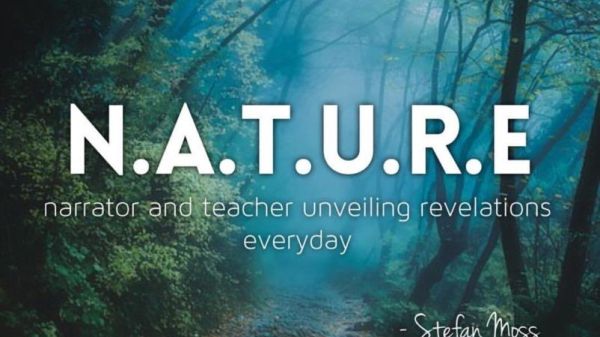EE in the Faith Community: Reaping the Physical and Spiritual Rewards

Environmental Education is a transformative and illuminating field of study. Students can immerse themselves in a variety of ecosystems, work in teams as they explore, understand the complexity of living and non-living things, and reflect on their connection to it all. While many institutions foster a diverse and inclusive atmosphere, and place a strong emphasis on scientific research in the outdoors, for students at faith-based schools, there is an additional dynamic at work, namely, the opportunity to forge deeper spiritual connections to the natural world.
My forays into this dimension began after completing my undergraduate work in biology. I came upon an opportunity to volunteer and live at a youth camp, and began spending time there with the camp director, a pastor who had a passion for propagating native trees. His years of experience and jovial personality endeared him to the local community. He taught me a lot, and would often mention his spiritual connection to the plants he grew. While engaged in Bible study one evening, I decided to look up all the scriptural references to trees and was amazed at how many times they appeared. In each passage, there was some moral lesson, some nugget of truth that could be harvested. The influential parables of Christ are filled with references to nature, from mustard seeds to pearls. The writings of King Solomon are replete with wise sayings, many of which are simple observations of the natural world, with an additional insight provided that speaks to the human condition. Consider this one from the Book of Proverbs, Chapter 6:6-8;
“Go to the ant, you sluggard, consider its ways and be wise! It has no commander, no overseer or ruler, yet it stores its provisions in summer and gathers its food at harvest.”
The stewardship ethic is undeniable here, and although we often speak of the importance of natural resource management in our work as educators, it can be a challenge to connect that ethic to other aspects of our student’s lives. However in the faith community, not only is the bridge to ethics encouraged, it is seen as a way to deepen each student‘s connection to the observations that they make. In other words, students can study animal behavior, and also learn how to be better human beings. My understanding of this interesting connection to the natural world, and its translation into positive and ethical behavior is what led me to launch Solomon’s Minds in the fall of 2000. Through Solomon’s Minds, I’ve been able to consult with government agencies and businesses, as well as faith-based schools and church communities to bridge the gap between the natural world and the spiritual one. A few years ago I wrote a grant for a local private faith-based school to build a small outdoor classroom with ten observation stations for students to get out into nature. The students were ecstatic and the teachers used the stations for science, math, art, as well as spiritual lessons. I am in the process of receiving another grant to build two raised bed gardens for an elementary school. Students will be able to grow tomatoes, blueberries, and other goodies while learning basic principles of germination and fruit bearing, concepts that carry spiritual undertones, but are obviously important topics within the realm of environmental education.
Many scientists and educators around the country are deeply concerned about the lack of scientific literacy and the threat it poses to our understanding of climate change and other important environmental issues. We need as many hands on deck as possible in order to create a sustainable future. The faith community serves a critical role in this regard as stewards of the planet and students of nature, reaping the physical and spiritual rewards that it has to offer.
-Stefan Moss
